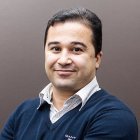Power Electronics
Power electronics and its applications are vital in various industries for efficient and reliable energy conversion and control.
The Power Electronics online course explores the fundamentals of power electronics, providing you with the groundwork to comprehend the essential principles driving modern technology. You'll gain the necessary knowledge to effectively shape and utilize electronic systems for the future.
After taking the course, you will be able to
- explain the diverse applications where power electronics play a key role
- calculate the different power, voltage, and current calculations (instantaneous, average, apparent power, RMS, THD, etc.)
- identify the functioning of Power Electronic Devices such as Diodes, Thyristors, MOSFETs, and IGBTs
- evaluate the operation of both half-wave and full-wave uncontrolled and controlled rectifiers
- assess the steady-state operation of buck, boost, and buck-boost converters in continuous conduction mode
- apply pulse-width modulation (PWM) techniques to synthesize desired output voltages for basic converter topologies
- examine 3-phase converter waveforms.
Is your organization interested in enhancing your team's skills and expertise? Contact us to explore the possibilities of transforming our existing content into tailored solutions for your team or organization.
Start
Fee:
Contact us
This asynchronous online course allows you to learn at your own pace, on your own schedule from anywhere in the world.
Gain a good basic understanding of power electronics and complete academically verified credentials.
Possibility to continue your learning journey with Converter Techniques course that allows you to deepen your knowledge.

For
This online course is suitable for people interested in power electronics.
The course offers a comprehensive introduction to the fundamental principles and applications of power electronics and at the same time it gives you a good foundation to continue your learning journey with our Converter Techniques -course.
Prerequisite: To ensure a smooth and comprehensive learning experience in the "Power Electronics" course, students should have a basic understanding of electrical circuits and fundamentals.
While no prior knowledge of power electronics devices (semiconductors, converters, etc) is required, a familiarity with basic concepts such as voltage, current, resistance, inductance, capacitance, as well as basic circuit analysis, will be beneficial.
Contents and Schedule
This course aims to provide a solid understanding of power electronic devices, converter topologies, and analysis techniques. The course begins by exploring of power electronics' role in a wide range of applications and emphasizes its significance in modern power systems. Key power electronic devices like diodes, thyristors, MOSFETs, and IGBTs are discussed, including their operation and characteristics. Both uncontrolled and controlled rectifiers, encompassing half-wave and full-wave configurations, are analyzed. The course further focuses on basic converter topologies such as buck, boost, buck-boost, and voltage source inverters.
The course consists of short videos, texts, reflection tasks and quizzes. The course is divided into six modules, each focus on a specific topic. The language of the course is English, and all videos include English subtitles. You can complete the course flexibly at your own pace.
The estimated study time of the course is 54 hours and learners have access to the course materials for three months. You can complete the course flexibly at your own pace. We recommend that you schedule your studies and complete around one module per 1-2 weeks.
- Module 1 – Introduction
- Module 2 – Introduction of Power Electronic Devices
- Module 3 – Half-Wave Rectifiers
- Module 4 – Full-Wave Rectifiers
- Module 5 – dc-dc Converters (Buck, Boost, Buck-Boost)
- Module 6 – DC-AC Inverter
Instructors

Edris Pouresmaeil
Edris Pouresmaeil is a Professor in the Department of Electrical Engineering and Automation (EEA) and serves as the head of the Renewable Energies for Power Systems group at Aalto University in Finland.
Pouresmaeil has held various positions at esteemed institutions around the world, including the ESTIA Institute of Technology in France, the University of Southern Denmark (SDU) in Denmark, and the University of Waterloo (UW) in Canada.
Dr. Pouresmaeil's research expertise lies in the operation and control of power electronics in power systems, the integration of renewable energy sources into power grids, microgrid operations, and control, as well as the modeling and development of hybrid energy storage systems centered around green hydrogen.















